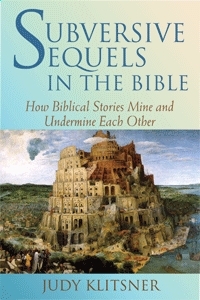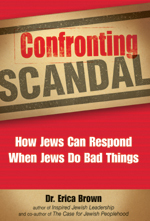The Kosher Bookworm: Yom Kippur taken seriously
The Kosher Bookworm
by Alan Jay Gerber
Issue of September 17, 2010/ 9 Tishrei 5771Yom Kippur often has an extra, added spiritual affect on even the most marginally observant Jews. Whether it is the fasting or the abstinence from daily routine, Yom Kippur gives pause to all Jews to consider the true purpose of our lives.This year two pieces of literature, each in its own manner, serve to point us in the right direction. We begin with “Subversive Sequels in the Bible” by Dr. Judy Klitsner (Jewish Publication Society, 2010). Klitsner, a devotee of the late Nechama Leibowitz, and a lecturer at Jerusalem’s Pardes Institute, draws a striking parallel between the readings of Noah and Jonah.
“Noah and Jonah: two prophets navigate perilous waters aboard their boats, apart from the doomed populations they might have saved,” Klitsner writes. “Names, words, and themes are shared freely by their narratives. In both, rampant injustice, hamas, threatens to seal the people’s fate; both speak of a 40-day period preceding a planned annihilation. Each story prominently features a ‘yonah’ — Jonah’s Hebrew name is identical to that of the winged messenger sent by Noah, the dove. Both stories highlight such rare locations as Tarshish and Nineveh. Both narratives focus on personal chronicles of the prophets themselves, while presenting the barest minimum in the way of the actual prophecy they deliver. And both prophets… judge themselves and others very harshly. As a result, each sinks into a state of self-induced oblivion: Noah through alcohol, Jonah through a coma-like slumber.”
This message is, “especially relevant to Yom Kippur, the day in the Jewish calendar that has been set aside for self-transformation,” Klitsner continues. “The book of Jonah, as subversive sequel to the story of the inevitable destruction in the days of Noah, challenges its readers to view themselves as endlessly capable of rewriting their own stories in radically new ways.”
In other words, teshuvah.
Here we see these two ancient personalities linked thematically together to teach profound lessons in the art of teshuvah for us to ponder during Yom Kippur. A read of this chapter in this very challenging book should serve to give you a portrait of what constitutes a “subversive sequel” and its importance to the lessons of repentance.
The other book, “Confronting Scandal: How Jews Can Respond When Jews Do Bad Things” by Dr. Erica Brown [Jewish Lights, 2010], skillfully uses the Yom Kippur liturgy of Al Chet to highlight the monumental chillul Hashem of the criminal behavior of some within our religious community.
Each chapter is highlighted by the communal Al Chet response that is linked to the particular chapter’s content. The communal shame is dealt with in a forthright manner, with issues like mesira, informing on a fellow Jew, and chillul Hashem, desecration of G-d’s name, discussed and dealt with in a mature and dispassionate way.
“On Yom Kippur we begin the opening Kol Nidrei service with a request for permission to ‘pray with transgressors,’” Brown writes. “This custom is based on a Talmudic statement made by Rabbi Shimon Chasida, who said, ‘A public fast wherein Jewish transgressors do not participate is not a fast.’” The author goes on from this to develop practical aspects that must be considered in the handling of those who violate the law and then hide behind a communal shield of protection.
Further, the author even presents a litany of Al Chet responses that reflect upon this modern day plague. Here are some:
“In the spirit of experimentation, I put together a list contemporary Al Chets to elaborate on the sin of chillul Hashem that we confess to transgressing each year. This time, I’ve translated the introductory expression to reflect the plurality of sin rather than its singularity.
For our sin of thinking that ethics is someone else’s issue.
For our sin of believing that we can wrong others without corroding our own souls.
For our sin of making Jewish affluence a bigger priority than Jewish goodness.
For our sin of thinking that Jewish education is not about values education.
For our sin of cheating on a test because we thought that a grade was more important than our integrity.
For our sin of not working harder to improve the reputation of our people in the world every day.”
In reality, this list can be endless. This is the human condition: we are indeed frail creatures in need of a cure. This is the challenge that this book presents to us.
This is a timely challenge. If you do not believe me, read the daily papers and listen to the news. These sordid stories involve wealthy businessmen, prominent rabbis, teachers and housewives — the full gamut of society. No sector is immune and all have to account. Yom Kippur is a major part of that accounting to G-d. We are left to deal with the rest by ourselves.
Have a meaningful fast and a happy, healthy and prosperous new year.

 46.0°,
Light Drizzle
46.0°,
Light Drizzle 







